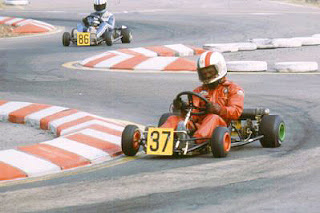By
the age of 17, Andrea had accumulated a good deal of karting experience, giving
him the confidence to compete in the World Championship, run in 1977 at the
Parma circuit. His performance was fully
competitive and at the event’s conclusion his placing was fifth. That year he also began his car racing
career, initially practising in a 1970 Tecno.
This was an unusual model, being a F3 car adapted for Gustavo Palermo’s
use in Formula Ford, a category for which Tecno did not build a specific
variant. Confident from that experience,
Andrea took part in the Italian Super Formula Ford 2000 series. At the wheel of an Osella, Andrea won 2
races, (and achieved 3 podiums), finishing fifth in the championship, which was
won by fellow future F1 participant, Teo Fabi.
This success, especially in terms of sustaining performance over a
series as well as at an individual event, warranted the step-up in 1978 to
Formula 3. The Marlboro
connections/influence came into play once more, Andrea being taken under the
wing of Tim Schenken and his Marlboro Team Tiga operation. The team ran Andrea in a Ralt RT/1-Novamotor
(Toyota), a car that proved ultra-competitive against the main rival March 783,
though the Tiga car was a two year old example.
The category was at that time the main proving ground for drivers
seeking elevation to Formula 1. As a result,
Andrea’s first season in really serious motor racing saw his nascent expertise
pitched against such future super high achievers as Alain Prost, Nelson Piquet,
Nigel Mansell, Arie Luyendijk and Bobby Rahal.
Formula 3 was very high profile in Britain, and two championships were
based in the country, whilst some UK-based runners also entered the European
Championship. Andrea took part in all
three, albeit only in two races of the European series – and in the Donington
round in August in he finished a strong fourth. In the BARC BP Championship,
Andrea was placed seventh after a total of 17 races, including a brace of third
places.
 |
| Winning at Thruxton, April 1979 |
Having already characterised Andrea and Gilles Villeneuve as committed racers – always seeking victory rather than just a ‘points finish’ – there’s no incongruity now in referring to another such driver – Nigel Mansell. His robust attitude and mental resilience in competing with Ayrton Senna made him a great British favourite, who was also lauded as ‘il leone’ in Italy when he drove for Ferrari. But Nigel did complain a lot – as good a whinger as he was a driver – and he was well known for his tendency always to attribute blame for problems/incidents to anyone but himself. And certainly, he did experience more than his fair share of problems, for instance, a broken back at the 1979 Formula 3 meeting at Oulton Park. Reports of the incident are typified by this: https://f1history.fandom.com/wiki/Andrea_de_Cesaris:
A wheel banging incident with Nigel Mansell broke the Briton's neck, and did little to improve Andrea's wild reputation.
At Oulton Park, Nigel came into contact with his competitor and broke his back. (https://www.gptoday.net/en/news/f1/243962/the-second-chance-nigel-mansell-broken-neck-tears-and-a-championship-loss-at-suzuka)
For further clarification we can consider what Nigel himself said, but bear in mind that he was prone to being unequivocal in pointing the finger of blame at his competitors:
I broke my back in a very serious accident at Oulton Park, Cheshire. From my point of view, the incident was totally avoidable. Andrea de Cesaris was coming up on the inside of me going down a hill, but there was no room.* In those early days, he had something of a reputation for being erratic at times, and on this particular day his car touched mine and instantly flipped me over.
*As is increasingly recognised, it is the duty – not just a manifestation of good track manners - of a driver to make reasonable ‘room’ for a clearly faster car.
To this day I retain great respect for Nigel and his many high level achievements, but I believe that had Andrea been the sole culprit, his description of the Oulton Park incident would have been more along the lines of, ‘he just drove straight into me,’ rather than the woolly reference to ‘no room,’ and ‘his car touched mine.’ Apologies for repeating the word, but it does have a specific meaning in motor sport: what we seem to be considering here is a ‘racing incident,’ defined as an interaction wherein no single participant is wholly at fault, the occurrence of which from time to time is inevitable when people compete with one another at high speeds in relatively confined spatial areas.
Away from the fierce competition seen in the three F3 championships, Andrea enjoyed two drives involving less pressure. As mentioned above, he took part in his first Formula 2 race. This was round 5 of the European Championship at Vallelunga. Driving a March 792, he was a very respectable sixth. In October he partnered Tony Carellos and Renato Meiohas in a Lancia Stratos, entered by Jolly Club to the Giro d’Italia, in which they finished fifth.
March
Cars provided Andrea with an early start to his competitive 1980 by entering
him in a March 792-Ford BDA for the Aurora AFX International Formula Pacific
run in January and February in New Zealand.
Of the eight races, Andrea won two and accumulated enough points to be ranked fourth
in the championship.
 |
| Formula Pacific, New Zealand, 1980 |
Part 2 (next post) covers Andrea's early Formula 1 career up to the end of the 1982 season


No comments:
Post a Comment